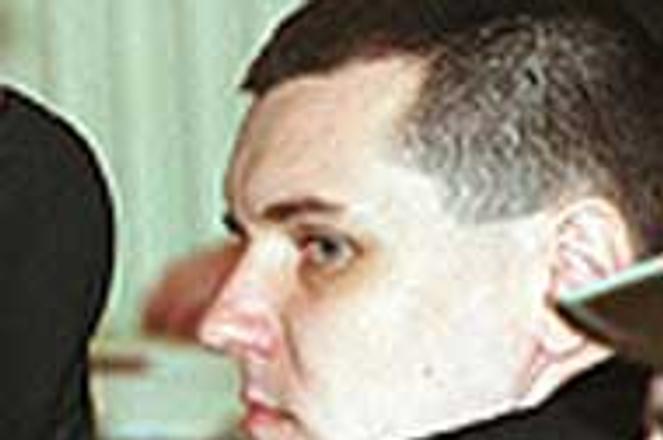Banská Bystrica mobster Mikuláš Černák (right) confers with defence attorney Ján Gereg shortly before being sentenced to 15 years in jail.foto: TASR
More than two years after mafia boss Mikuláš Černák was taken into custody, a regional court in central Slovakia's Banská Bystrica sentenced him to 15 years in a maximum security jail. Černák, who was tried with eight of his gang accomplices, was found guilty of the 1996 murder of Polish businessman Grzegorz Szymanek and the extortion of businessmen in the Banská Bystrica region. Six of the other suspects were given jail terms from two to ten years, and two were set free.
The convicted criminals immediately appealed their January 28 sentences to the Supreme Court, as did prosecutor Jarmila Kováčová, who felt that Černák should have been found guilty on several additional charges. The Supreme Court is expected to rule on the case within several weeks, although justices may need far longer than that to review the 7,000-page file compiled by police and the regional court.
While the conviction represents the first major victory for the Slovak police in their fight against organised crime, several top officials said they were disappointed the penalties hadn't been heavier. Slovak law allows courts to impose a life sentence with no chance of parole, but Černák may be back on the streets within eight years if he behaves well.
Interior Minister Ladislav Pittner told the SITA press agency on January 28 that the verdict could have been harsher, but that new charges were being brought by police. "It's not over yet," he said.
Daniel Lipšic, a senior Justice Ministry official, told the Národná Obroda daily on January 27 that he, too, was unhappy with the proposed punishments. "The Slovak justice system uses the 'absorption principle', which means that suspects are sentenced based only on the most serious crime they committed, which in this case is murder," he said. "Other crimes are ignored. I believe that the cumulative method [where additional crimes bring longer sentences] is much better."
According to a police investigator who helped build the case against Černák, and who spoke to The Slovak Spectator on condition of anonymity, Černák first got into crime as a bus driver in 1991. "He became the owner of a private security agency named Security 3, which allowed him and his colleagues to carry guns legally," the police investigator said. "They were active in many criminal areas like extortion, car smuggling and murder, as well as in serious business activities like construction."
It was in sifting through Černák's legitimate construction contracts, the investigator added, that police had begun to suspect the former bus-driver had connections with political figures. "Černák's construction company built the District Office building in the town of Krupina, so I believe he had some connection with at least local state officials," said the source. "In order to get any public contract in this country you have to have adequate political backing."
The investigator's suspicions were echoed by a senior Interior Ministry source. "According to the information I have, Černák not only built up a group of criminals who were subordinate to him, but also kept contacts on the horizontal and vertical planes. This means he was himself subordinate to a higher body. However, it's too early to name names."
The Slovak media has long circulated stories of connections between Černák's 50-member underworld group and the Slovak Intelligence Service (SIS) under former Prime Minister Vladimír Mečiar. A photograph showing Černák standing 10 meters from then-Interior Minister Gustáv Krajči during the laying of the Krupina Office foundation stone has been cited as "evidence" of high-level political contacts as well.
But prosecutor Kováčová said that no such evidence had emerged in Černák's trial. "This was largely white collar crime, where the individual members of the group didn't know each other in order to make detection more difficult. Thus, collecting evidence was extremely difficult," she said.
The trial was unusual in Slovakia for its tight security. Proceedings were held in a Banská Bystrica prison, rather than in the regional courthouse, and suspects were flown by police helicopters from their prison cells in Leopoldov to Banská Bystrica by pilots in bullet-proof vests. The streets around the trial location were kept off-limits to pedestrian and vehicle traffic, and even presiding judge Ľubomír Samuel was forbidden to park inside the prison.
The intense security was a measure of the importance the police - and Černák's gang - attached to the trial. Interior Minister Pittner reported last November that the Slovak mafia had put out a contract worth 25 million Slovak crowns ($580,000) on the star witness, the former criminal Alexander H. who provided key testimony on the murder charges against Černák.
The trial was also a relatively high-tech affair, with some witnesses being heard live by TV remote feed. Interior Ministry Chief Investigator Jaroslav Ivor said the new methods were an answer to the increasing sophistication of organised criminals in Slovakia. "Criminals are using new technology in their activities, and the police and courts aren't able to respond to these security threats by typical arrangements like cordoning off crime sites, interrogating witnesses and so on. We have to be one step ahead with methods like phone taps and electronic surveillance."
According to Ivor, however, the panel of eight judges who adjudicated the trial were taken aback by the newfangled tactics. "The justice system isn't ready for these methods. Even during the trial, the court had to use police technical equipment for hearing hidden witnesses," Ivor said. "But they quickly realised the advantage of the new equipment."


